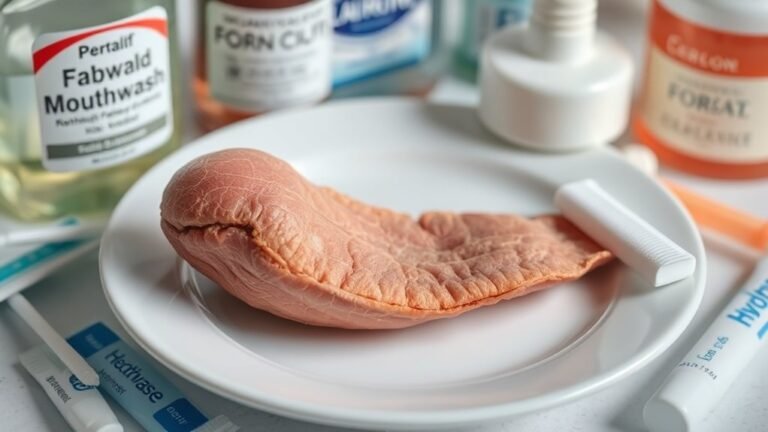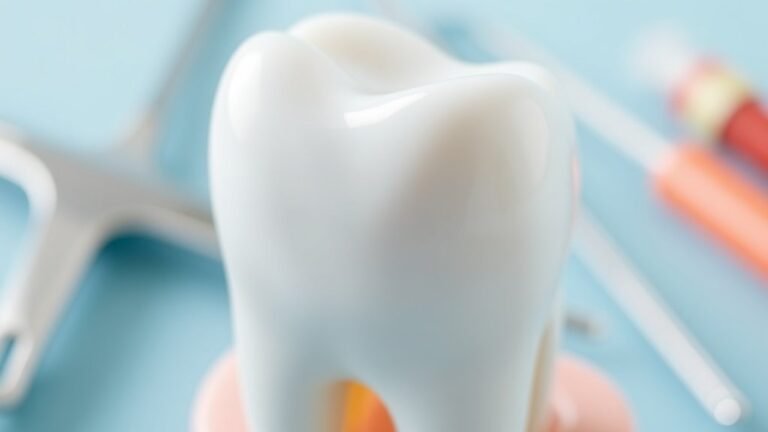How Do Dry Mouth Conditions Worsen Enamel Erosion and Tooth Sensitivity
Dry mouth conditions worsen enamel erosion and tooth sensitivity because inadequate saliva creates a drier oral environment. This promotes harmful bacterial growth, accelerating enamel degradation. Saliva also lubricates and protects teeth; without it, friction increases, leading to enamel wear and exposing dentin. As enamel erodes, sensitivity to hot, cold, or sweet stimuli heightens, causing discomfort. Understanding these connections is essential for better management of your oral health and discovering effective strategies to alleviate the impact of dry mouth.
Key Takeaways
- Dry mouth reduces saliva production, leading to an increase in harmful bacteria and acids that erode tooth enamel.
- Lack of saliva inhibits the neutralization of acids, resulting in a more acidic oral environment that contributes to enamel erosion.
- Reduced lubrication from saliva increases friction during chewing and brushing, which can wear down enamel and heighten sensitivity.
- Exposed dentin due to enamel erosion makes teeth more sensitive to hot, cold, and sweet stimuli, causing discomfort.
- Without sufficient saliva, the mouth struggles to remineralize enamel, further accelerating erosion and increasing the risk of dental issues.
Understanding Dry Mouth: Causes and Symptoms
When you experience dry mouth, it’s more than just an uncomfortable sensation; it can signal underlying issues that need attention. Known medically as xerostomia, this condition occurs when your salivary glands don’t produce enough saliva. Several factors may contribute to dry mouth, including medications, dehydration, and certain medical conditions like diabetes or autoimmune disorders. Symptoms can vary but often include a persistent thirst, difficulty swallowing, and a dry or sticky feeling in your mouth. You might also notice bad breath or changes in taste. Recognizing these symptoms early is vital, as untreated dry mouth can lead to complications, including tooth decay and gum disease. Seeking professional guidance can help you manage xerostomia effectively.
The Role of Saliva in Oral Health
Saliva plays an essential role in maintaining your oral health by providing a protective barrier against harmful bacteria and acids. It helps regulate the pH balance in your mouth, neutralizing acids that can lead to tooth decay. Understanding these functions highlights the importance of saliva, especially when you’re experiencing dry mouth.
Saliva’s Protective Function
Although it often goes unnoticed, the role of saliva in maintaining oral health is vital. Saliva acts as a natural defense mechanism, providing lubrication and facilitating the process of chewing and swallowing. Its flow aids in remineralizing enamel, neutralizing acids, and washing away food particles and bacteria. When you experience saliva flow reduction, these protective functions diminish, increasing your risk for enamel erosion and tooth sensitivity. A dry mouth compromises your oral health, leaving your teeth more vulnerable to decay and discomfort. Additionally, the lack of saliva can hinder the natural balance of oral flora, leading to further complications. Maintaining adequate saliva levels is essential to preserving your teeth and gums, ensuring a healthier mouth overall.
Impact on Oral Ph
A healthy oral pH is fundamental to preventing tooth decay and maintaining overall oral health. When you experience dry mouth, the lack of saliva disrupts this delicate balance, increasing acidity in your mouth. This acidic environment accelerates acid erosion, leading to enamel deterioration and heightened tooth sensitivity. Saliva plays an essential role in neutralizing acids, washing away food particles, and providing necessary minerals for tooth remineralization. Without adequate saliva, your oral hygiene efforts can become less effective, making it easier for harmful bacteria to thrive. As a result, you might face a higher risk of cavities and gum disease. It’s important to address dry mouth conditions promptly to protect your enamel and maintain a balanced oral pH for lasting oral health.
How Dry Mouth Affects Enamel Protection
Dry mouth can significantly compromise enamel protection, putting your dental health at risk. When saliva production decreases, your teeth lose essential defenses against enamel erosion, leading to increased tooth sensitivity and other complications. Consider these effects:
Dry mouth compromises enamel protection, risking dental health and increasing tooth sensitivity. Prioritize hydration and oral care for stronger teeth.
- Saliva helps neutralize acids from food and bacteria.
- It plays a fundamental role in mineralizing enamel, reinforcing its structure.
- Reduced saliva leads to a dryer oral environment, promoting harmful bacteria.
- Lack of lubrication increases friction, potentially causing enamel wear.
Without adequate saliva, the protective barrier around your teeth weakens, accelerating enamel erosion. This can heighten your risk of experiencing tooth sensitivity, making everyday activities like eating and drinking uncomfortable. Prioritizing hydration and oral care is imperative to maintaining enamel health and overall dental well-being.
The Connection Between Dry Mouth and Tooth Sensitivity
When you experience dry mouth, you might not realize how closely it’s linked to tooth sensitivity. Reduced saliva production creates an environment where your teeth are more vulnerable. Saliva plays an essential role in neutralizing acids and providing vital minerals, so when it’s lacking, your enamel suffers. This weakened enamel exposes the underlying dentin, leading to increased dental sensitivity, especially when consuming hot, cold, or sweet foods. Additionally, dry mouth can lead to a higher risk of cavities, further exacerbating sensitivity issues. Managing your dry mouth, whether through hydration, salivary substitutes, or discussing options with your dentist, can greatly improve your comfort and oral health. Don’t underestimate the connection between dry mouth and the sensitivity you may be experiencing.
The Impact of Enamel Erosion on Dental Health
Enamel erosion can greatly affect your dental health, leading to increased tooth sensitivity and discomfort. Understanding the causes, such as acidic foods and poor oral hygiene, is essential for prevention. If left unaddressed, enamel erosion can result in serious long-term consequences, including cavities and tooth loss.
Causes of Enamel Erosion
Many factors can contribute to enamel erosion, considerably impacting your dental health. Understanding these causes is vital for prevention and enamel remineralization.
- Acidic foods and beverages, like citrus fruits and soda
- Frequent snacking, which exposes teeth to acids more often
- Mouth dryness, reducing saliva’s protective effect
- Poor oral hygiene, leading to plaque buildup
These elements can erode enamel, making teeth more susceptible to decay and sensitivity. When saliva production decreases due to mouth dryness, your teeth lose a natural defense against acid attacks. By addressing these factors, you can help maintain your enamel health and prevent further damage. Regular dental check-ups and a balanced diet are essential for preserving your smile.
Symptoms of Tooth Sensitivity
Tooth sensitivity often arises as a direct consequence of enamel erosion, leaving you vulnerable to discomfort during everyday activities. Symptoms typically include sharp, sudden tooth pain in response to hot, cold, or sweet stimuli. You may also experience discomfort while brushing or flossing, as exposed dentin becomes more reactive. This condition, known as dentin hypersensitivity, occurs when the underlying dentin layer is no longer protected by enamel, allowing external factors to irritate the nerve endings. You might find that certain foods or drinks trigger discomfort, hindering your enjoyment of meals. Recognizing these symptoms early is essential, as addressing tooth sensitivity can help mitigate the progression of enamel erosion and preserve your overall dental health.
Long-term Health Consequences
As enamel erosion progresses, you may encounter a range of long-term health consequences that can considerably impact your dental well-being. These effects underscore the importance of proactive dental care and teeth protection:
- Increased sensitivity to hot and cold foods
- Higher risk of cavities and decay
- Potential for gum disease
- Altered bite alignment
Without proper intervention, these issues can lead to more severe dental problems, requiring extensive treatments. You might find that maintaining your enamel becomes increasingly challenging, making regular dental check-ups essential. Also, incorporating protective measures, such as fluoride treatments and specialized toothpaste, can help mitigate these risks. Remember, prioritizing your dental care today can safeguard your oral health for the future.
Identifying Risk Factors for Dry Mouth
While it’s easy to overlook, recognizing the risk factors for dry mouth is essential for maintaining oral health. One important factor is your diet impact; high sugar and acidic foods can disrupt salivary glands, leading to decreased saliva production. Medications, particularly antihistamines and antidepressants, are also common culprits. Additionally, certain medical conditions, like diabetes and Sjögren’s syndrome, can greatly affect your saliva flow. Lifestyle choices, such as smoking or excessive alcohol consumption, further exacerbate dry mouth conditions. If you’re experiencing symptoms, evaluating these risk factors can help you understand your situation better. By staying informed, you can take proactive steps to protect your teeth and overall oral health.
Strategies to Manage Dry Mouth
Managing dry mouth effectively requires a multifaceted approach tailored to your specific needs. Here are some strategies you can implement:
- Stay hydrated: Drink plenty of water throughout the day.
- Use saliva substitutes: Look for over-the-counter products designed to mimic saliva.
- Implement fluoride treatments: Regular fluoride treatments can help protect your enamel from erosion.
- Schedule regular dental visits: Frequent check-ups allow your dentist to monitor your oral health and recommend personalized solutions.
Dental Treatments for Erosion and Sensitivity
Dental treatments for erosion and sensitivity play an essential role in maintaining your oral health and comfort. When you experience dentin exposure due to enamel erosion, it can lead to increased sensitivity. To combat this, your dentist may recommend sensitivity toothpaste, which contains active ingredients that help block pain signals from reaching your nerves. Additionally, fluoride treatments can strengthen enamel and reduce vulnerability to erosion. In some cases, dental sealants or bonding materials are applied to protect exposed areas and minimize discomfort. Regular dental check-ups are vital for monitoring your condition and adjusting treatment as needed. By addressing erosion and sensitivity proactively, you can maintain a healthier, more comfortable smile.
Maintaining Oral Hygiene With Dry Mouth Conditions
How can you effectively maintain oral hygiene when dealing with dry mouth conditions? A dry mouth can lead to increased bacterial growth and disrupt your oral microflora, making it crucial to adopt specific hygiene practices. Here are some strategies to help:
Maintaining oral hygiene is vital when facing dry mouth, as it can disrupt oral microflora and increase bacterial growth.
- Stay Hydrated: Drink plenty of water to help stimulate saliva production.
- Use Alcohol-Free Mouthwash: This can combat bacteria without causing further dryness.
- Chew Sugar-Free Gum: This promotes saliva flow, which is essential for maintaining oral health.
- Brush and Floss Regularly: Verify you use a fluoride toothpaste to strengthen enamel and protect against erosion.
Frequently Asked Questions
Can Medications Cause Dry Mouth and Worsen Enamel Erosion?
Yes, many medications can cause dry mouth, leading to decreased saliva production. This can result in increased enamel erosion and tooth sensitivity, as saliva plays an essential role in protecting teeth and maintaining oral health.
Are There Natural Remedies for Dry Mouth Relief?
Like a desert thirsting for rain, your mouth craves moisture. Natural remedies include staying hydrated, chewing sugar-free gum, using coconut oil, and sipping herbal teas. These can help alleviate dry mouth and promote comfort.
How Does Aging Influence Dry Mouth and Tooth Sensitivity?
As you age, your body produces less saliva, increasing the risk of dry mouth. This reduction can heighten tooth sensitivity, making it essential to maintain hydration and seek dental advice for managing these changes effectively.
Is Dry Mouth a Sign of a More Serious Health Issue?
When it comes to dry mouth, you shouldn’t ignore it; it can signal underlying health issues. Conditions like diabetes or autoimmune disorders often cause it, so getting checked out is essential for your overall well-being.
Can Diet Changes Help Alleviate Dry Mouth Symptoms?
Yes, dietary changes can help alleviate dry mouth symptoms. Staying hydrated, consuming water-rich foods, and avoiding caffeine or alcohol can improve saliva production, while sugar-free gum or lozenges stimulate saliva flow, providing relief.
Conclusion
To conclude, dry mouth greatly exacerbates enamel erosion and tooth sensitivity, leading to a cascade of dental issues. Did you know that nearly 30% of adults experience dry mouth at some point? This startling statistic underscores the importance of recognizing and addressing this condition. By understanding its effects and implementing effective management strategies, you can safeguard your oral health and maintain a confident smile. Don’t underestimate the impact of adequate saliva on your dental well-being.






